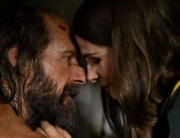Quartet follows on the recent success of The Best Exotic Marigold Hotel. While I’m not in the films’ “grey pound” demographic, as its older audience is described here in the U.K., I was intrigued to see 75-year-old Dustin Hoffman’s directorial debut.
Three retired opera singers, lifelong friends Wilf (Billy Connelly), Reggie (Tom Courtenay), and former colleague Cissy (Pauline Collins), plan the annual concert for Giuseppe Verdi’s birthday to raise funds for their opulent residential home for retired musicians, Beecham House. With the home in financial trouble, the success of the concert is imperative.
With the unexpected arrival of soprano Jean Horton (Maggie Smith), the most celebrated of the singers, musical director Cedric (Michael Gambon) envisages a triumphant reunion and guaranteed ticket sales. However, Jean is Reggie’s ex-wife (after a very brief marriage), and after an acrimonious split the pair haven’t communicated. Persuading them to let bygones be bygones is complicated by unresolved issues and resurgent feelings. The plans for the concert are thrown into disarray as old rivalries and theatrical temperaments undermine past glories and wreck rehearsals.
In this chamber exercise for a veteran British cast, plot is subsumed to performance. Maggie Smith plays the perfect diva delivering a slew of trademark barbs. (“This is not a retirement home; it’s a mad house.”) Tom Courtenay is her foil while Billy Connolly is effective comic relief as the lustful Wilf, always ready with a great one-liner. Hoffman gives Pauline Collins the meatiest part as the loveable confidante Cissy. Her mild form of dementia is first played for humor before Hoffman pulls focus onto the tragedy of her deteriorating condition.
To underscore the importance of the concert’s success, the introduction of the home’s financial difficulties is predictable, and you never fear the resident are in jeopardy of homelessness. Amid the fading rivalries, taunts, and standing ovations, Hoffman doesn’t fully engage with the vagaries of aging, but instead offers a rose-tinted romantic comedy to cheer the darkest pessimistic.
The end credits confirm Hoffman’s love for his adoptive country’s thespians by featuring youthful photographs of the cast, who’ve been treading the London stage or played in British orchestras for decades—a tribute to a vanishing world. Overall, it’s the stars’ performances that make Quartet a pleasure to watch despite its falsehoods. While Hoffman has an eye for what works on the big screen, Amour this is not.
While I originally saw Quartet at the BFI London Film Festival, I took my baby boomer parents to see it over the holidays. The mid-week auditorium was uncharacteristically sold out. While I expect my parents, a couple of aging hippies, to feel slightly patronized, they and the rest of the over-60s proved an enthusiastic audience. Whether this is confirmation of a neglected demographic, I don’t know, but I would be intrigued to see Hoffman tackle a deeper, more serious drama.







Leave A Comment